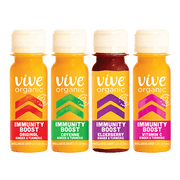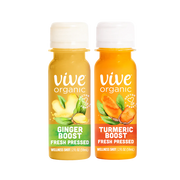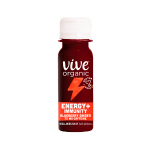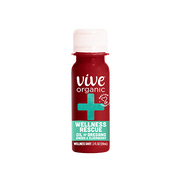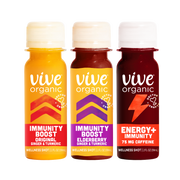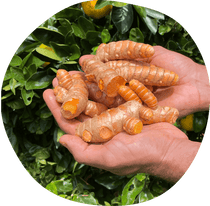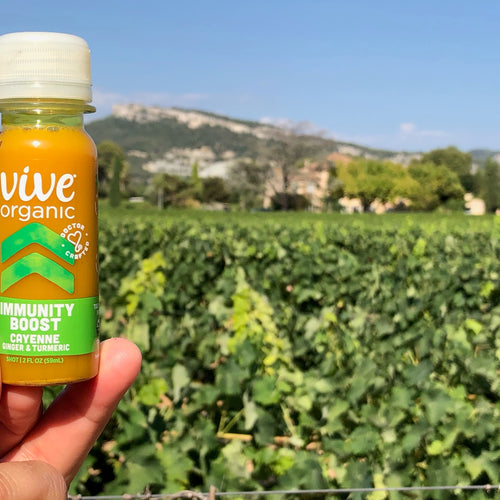Discover 25 Natural Sources of Vitamin C
Vitamin C is an immune-system booster, heart health supporter, iron absorption partner, a defender against free radicals, and more. To put it simply, vitamin C is a powerhouse nutrient – one that your body cannot live without.1
As an essential nutrient, vitamin C has a wide-ranging and important role in keeping you healthy and feeling your best. Because your body cannot make vitamin C, it’s critical you get enough of it through your diet and supplements.1
The good news is fruits and vegetables are delicious sources of vitamin C, making it easy for you to get what you need.1
In this blog we shine a spotlight on vitamin C, keep reading to learn:
- The facts on vitamin C and antioxidants
- The benefits of vitamin C and why vitamin C is important
- Your natural sources of vitamin C
- The recommended daily amounts of vitamin C
What is Vitamin C?
Vitamin C or ascorbic acid is an essential vitamin providing wide ranging nutritional support to your entire body. From helping support your immune system health to defending against free radicals, this mighty vitamin has an important role in your body.1
As an antioxidant, vitamin C helps protect your cells from free radical damage. Our bodies create free radicals and many of us are exposed to environmental free radicals including air pollution, cigarette smoke, toxins, and ultraviolet sunlight.1, 2
While free radical creation is a natural process, too many free radicals may cause oxidative stress. This is when antioxidants like vitamin C, get to work and slow or stop cell damage caused by oxidative stress.1, 2, 3
Your body cannot produce or store this water-soluble vitamin, relying on the foods and supplements you consume to provide adequate amounts.1
The Benefits of Vitamin C
The benefits of vitamin C include: 1, 4, 5
- Helps support iron absorption from plant sources and iron supplements
- Provides immune system support, encouraging the white blood cell activity and function
- Helps your body make red blood cells
- Necessary for making collagen, an essential protein in connective tissue active in wound healing
- Important for protein metabolism
- Wide range support for your cardiovascular, brain, bone, and immune system health
- Active antioxidant, protecting your body from free radical damage
You’ll notice we didn’t include protecting you from the common cold as a benefit of vitamin C. This is because there isn’t any verifiable science to prove this common belief. However, regularly taking vitamin C may help shorten the length of your cold and reduce the severity of your symptoms. 6
25 Natural Sources of Vitamin C
The great news is it’s easy to get enough daily vitamin C by consuming brightly colored fruits, vegetables, and wellness shots.
To make sure you’re getting enough daily vitamin C, try to make it a habit to eat and drink these delicious fruits and vegetables:
- Red acerola cherries
- Turmeric
- Ginger
- Kakadu plums
- Oranges
- Guava
- Strawberries
- Lemons
- Kiwi
- Lychees
- Blackcurrants
- Chili peppers
- Sweet yellow peppers
- Cantaloupe
- Parsley
- Kale
- Mustard spinach
- Broccoli
- Brussels sprouts
- American persimmons
- Papayas
- Cabbage
- Cauliflower
- White potatoes
- Tomatoes
There are so many fantastic food options in this list. And here are some of our favorite ways to consume these vitamin c-packed fruits and vegetables:
- Super smoothie: blend up a handful or so of strawberries and kale, dashes of turmeric and ginger, milk of your choice, protein powder or a couple tablespoons of natural peanut butter, and ice.
- Vitamin C-boost salad: toss together chopped kale, parsley, tomatoes, cauliflower, broccoli, kiwi, and yellow peppers with a dressing made of lemon juice, honey, olive oil, and a dash of salt.
- Afternoon snack plate: choose your favorite vitamin c-packed vegetables and fruits from your fridge and create a snack plate for an afternoon break and recharge. Hint add some guacamole or hummus on the side for a dip.
Are You Getting Enough Vitamin C?
Most people do get enough vitamin C from their daily diet. However if you smoke or are exposed to second hand smoke, have a limited diet, or have specific medical conditions, you may have trouble getting enough vitamin C.1
If you’re low in vitamin C for a prolonged period of time, you may develop scurvy. Signs of scurvy include fatigue, inflamed or bleeding gums, joint pain, small purple or red spots on your skin, slow and poor wound healing, anemia, corkscrew hairs, and depression. Please talk to your healthcare practitioner if you have an of these signs or think you might be low in vitamin C.1
The recommended daily allowances (RDA) for vitamin C based on age, sex, and life stage are:1
- Birth to 6 months: 40 mg
- Infants 7 – 12 months: 50 mg
- Children 1 – 3 years: 15 mg
- Children 4 – 8 years: 25 mg
- Children 9 – 13 years: 45 mg
- Teen boys 14 – 18 years: 45 mg
- Teen girls 14 – 18 years: 65 mg
- Adult men 19+ years: 90 mg
- Adult women 19+ years: 75 mg
- Pregnant teens 14 – 18 years: 80 mg
- Pregnant women 19+ years: 85 mg
- Breastfeeding teens 14 – 18 years: 115 mg
- Breastfeeding women 19+ years: 120 mg
- Individuals who smoke require 35 mg per day more vitamin C than non-smokers
Taking Care with Proactive Wellness
As you know it’s our mission to spread the good word about proactive wellness. We’re firm believers in giving everyone the information, tools, and resources they need to be proactive about their health and wellness.
This is why we research and publish these blogs – so you have easy access to proven science. The small steps add up – eating the rainbow, moving your body, getting enough sleep, and listening to your body cues.
We applaud you for taking a proactive and vested interest in your whole-body health.
Here’s to a happier, healthier, and kinder world.
Disclaimer: This blog contains promotional content about our products. The information provided in this blog is for educational and informational purposes only and should not be construed as medical advice. While the nutritional information and health tips shared here are based on published studies and expert insights, they should not replace advice and treatment from a healthcare professional. Always consult a qualified healthcare provider with any questions you may have regarding a medical condition or health objectives.
Resources
- Vitamin C: Fact Sheet for Consumers: National Institutes of Health (Accessed February 5, 2024) - https://ods.od.nih.gov/factsheets/VitaminC-Consumer/
- Antioxidants: In Depth, National Center for Complementary and Integrative Health (Accessed February 5, 2024) - https://www.nccih.nih.gov/health/antioxidants-in-depth
- Antioxidants Explained in Simple Terms, Healthline (Accessed February 5, 2024) - https://www.healthline.com/nutrition/antioxidants-explained
- Should You Take Iron With Vitamin C?: Cleveland Clinic (Accessed February 5, 2024) - https://health.clevelandclinic.org/iron-and-vitamin-c
- Vitamin C: Fact Sheet for Professionals: National Institutes of Health (Accessed February 5, 2024) - https://ods.od.nih.gov/factsheets/VitaminC-HealthProfessional/
- Common Colds: Does Vitamin C Keep You Healthy?: National Library of Medicine (Accessed February 5, 2024) - https://www.ncbi.nlm.nih.gov/books/NBK279544/
- 17 Foods That Are High in Vitamin C: Cleveland Clinic (Accessed February 5, 2024) - https://health.clevelandclinic.org/sources-of-vitamin-c
- 20 Foods That Are High in Vitamin C: Healthline.com (Accessed February 5, 2024) - https://www.healthline.com/nutrition/vitamin-c-foods
